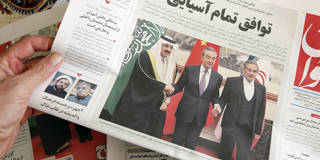A new Chinese-brokered restoration of diplomatic ties between Saudi Arabia and Iran is hardly sufficient to overcome those two countries’ longstanding hostilities. Far from representing a regional realignment, it is ultimately more likely to demonstrate the limits of China’s influence.
WASHINGTON, DC – The recently announced Chinese-brokered agreement between Iran and Saudi Arabia to restore diplomatic relations is the latest sign that China is muscling its way into international diplomacy. Some see the deal as further evidence of the United States’ eroding might and influence, and of its Middle East fatigue. In fact, the agreement is less a sign of American torpor than a reflection of unique regional circumstances.

WASHINGTON, DC – The recently announced Chinese-brokered agreement between Iran and Saudi Arabia to restore diplomatic relations is the latest sign that China is muscling its way into international diplomacy. Some see the deal as further evidence of the United States’ eroding might and influence, and of its Middle East fatigue. In fact, the agreement is less a sign of American torpor than a reflection of unique regional circumstances.